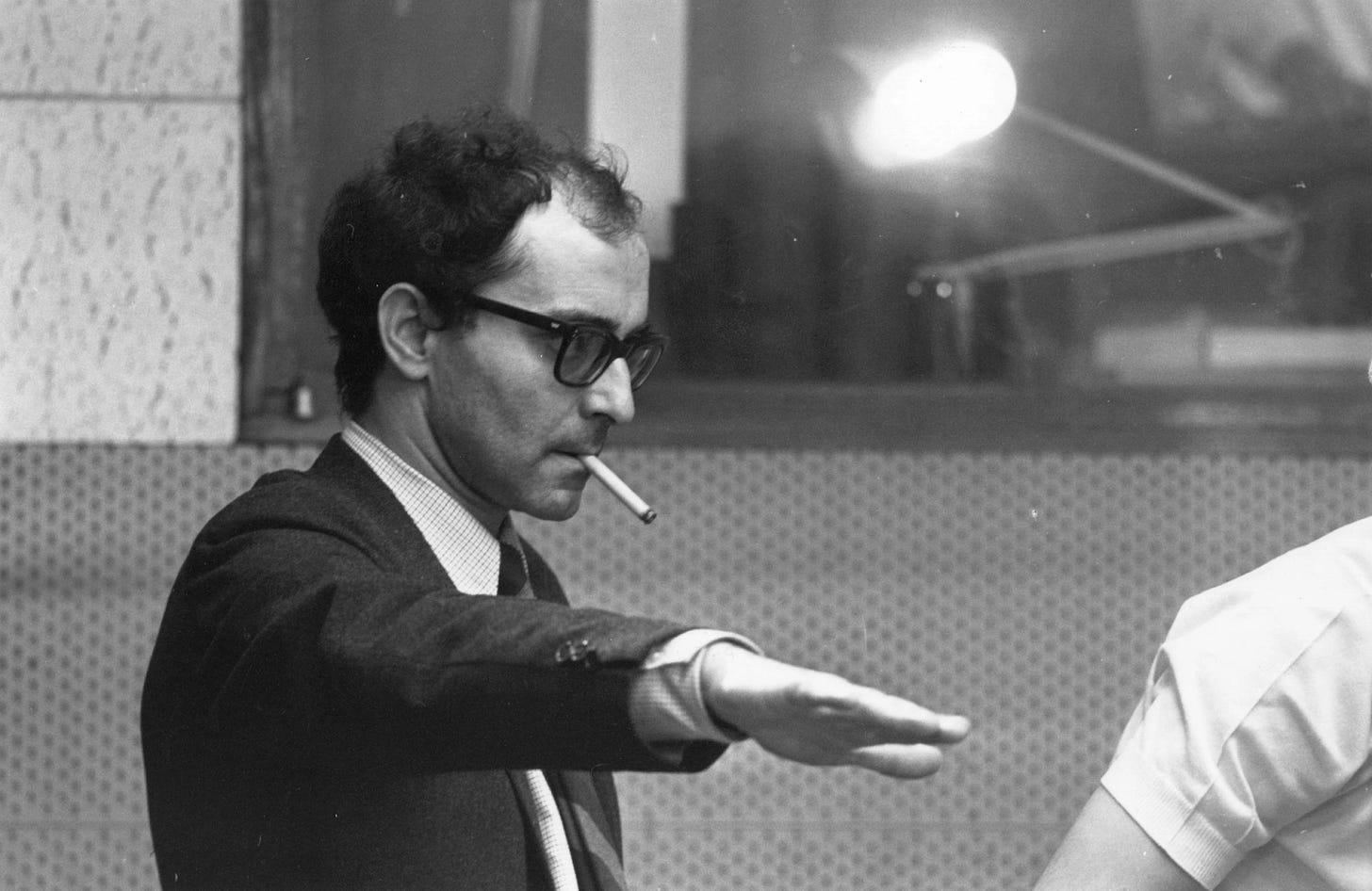Reaction Shots: Godard Bless
Plus what Jennifer Lawrence gets wrong about 30 Rock and the movie that you must watch
Everything is Jean Luc Godard
In the middle of Sydney’s CBD stands a large bookstore that is in front of the Town Hall I constantly frequent. The film and TV section is small but large enough to occupy some really great books. On my bookshelf right now is The Press Gang, Mystery of Cinema and I Lost it At The Movies, all bought at that very store. But there was a tome that I pass over, which is Everything is Cinema: The Working Life of Jean Luc Godard, Richard Brody’s biography of the French New Wave pioneer. Jean Luc Godard passed away this week at 92; four days after Elizabeth II went away. Having been born in a country that remains attached to the legacy of the Commonwealth, her persona will loom large with the bulk of the population, regardless of your opinion about the institution. The same can be said about Godard, a filmmaker who came from the pages of Cahiers Du Cinema and went on to find every possibility to elevate narrative and technique within cinema, no matter how you felt about the results.
I am scribing this through raw emotion, so this won’t be a comprehensive look at my experience of Godard. But he marked a significant point in the manner I watch movies that still continue to this day. There are marks of how you grow as a cinephile; you move on from watching mainly Western blockbusters of yesteryear to working your way around the canon that certifies that this certain work is important in understanding how the medium work. A sure sign that you are this passionate about cinema is when a director, active or not, makes several movies in a row that he/she immediately shifted your philosophy of the medium, whether you’re watching, making or writing about them.
Godard has made 46 features, from 1960’s Breathless to The Image Book in 2018. I have seen sixteen of these, much of which populated within the peak of the New Wave during the 60s. Each of these I have sat through only once as region-free DVDs borrowed from my university library, among many other films that made up my diet (a sample of these included Spirited Away, 8½ and This Sporting Life, the last DVD I borrowed before I graduated). Each were either unconventional, dry, noisy or provocative, or more. And regardless of the movie’s quality, one thing that has been consistent with Godard is how he will keep you guessing. You’re more likely to remember Anna Karina doing a musical number, his on-screen flirtations with Maoism and jump cuts that distort the manner of the dialogue. For me, the moment that lingers in my head is a continuous take off a gridlock that takes up five minutes in Weekend, which indicates that the director will go beyond linear narratives and twisted cuts. or the montage in A Married Woman, exemplifying a remark he quoted from D.W. Griffith in an interview about a gun and a girl being all you need in a cinema.
This brings me to Breathless, Godard’s feature debut which is not just his best-known film, but also of the French New Wave. It was also my first Godard film, and for the most part, I hated it. I disliked the poor excuse of the frequent cross-cutting and felt that his ironic perspective for American film noir was about as creative as a toddler doing fingerpainting. I’m aware that I’m in the 0.0001% of people who possess this opinion and for what it’s worth, Godard would have expected this kind of reaction. Not in a manner of a troll, but to find more boundaries to break and through his aesthetic is this innate baiting towards not just people who couldn’t stand his films, but those who adored the French New Wave.
I finally purchased the Brody biography of Jean Luc Godard, and given that I’m not the most articulate fan of his, I’ll leave it with another Godard scholar to have the final word:
Godard, still a mysterious name. Ross Cacavalle, who programmed Detroit’s arthouses, the Studio Theaters, introduced him to me and a classroom of high-school students, joking: “His name is Godard and some people consider him the god of movies.” This was the era when rock musician Brian Eno’s name was scrawled on campus walls (“Eno is God”). I never thought of Godard with religious reverence but enjoyed his beautiful, difficult movies for being devout, connecting all things and all things cinema.
30 Rockefeller Republican
Political punditry and celebrities mix like a wholewheat doughnut and celery all eaten with one bite. Not as creative as you think, but also distracting from approaching particular tastes. I try to refrain from commenting about the opinions of actresses and actors outside of their job, because when I do, I ask myself, what am I achieving in this situation? The first time I did, it was when Academy Award winner Matthew McConaughey was interviewed by Joe Rogan and Jordan Peterson, which pissed off some film journalists who actively loathe those two figures with a passion. And the last time I commented, Academy Award nominee Seth Rogen was saying it was fine for someone to have their valuables stolen in LA, and it reeks of privilege. But ultimately, I came to the conclusion that these controversies are stupid, because what caused them is stupid, and I move on with my life.
That being the case, Academy Award winner Jennifer Lawrence was interviewed for Vogue, and a significant aspect of it has been her politics. If you have been living under a rock for a while, you would know that Jennifer Lawrence hates Republicans. She thinks that Tucker Carlson and Ohio Senate candidate and Hillbilly Elegy author JD Vance should go kick rocks. If you think that is shocking, wait til you hear what another person thinks about Trump. But making the situation sticky is that her family are rock-ribbed GOP voters.
However, that’s not what I’m interested in, since this observation caught my eye:
Growing up in a conservative home, Lawrence thought of herself as Republican. But it was almost a cultural thing, like sports or something. She had the notion that there were two teams and that the Republicans were her team. Then one night when she was 16, she was watching 30 Rock and Liz Lemon said something along the lines of, I’m not a crazy liberal. I just think people should drive hybrid cars. It made sense. It seemed rational. Later, when she made movies in other countries, she saw how money always tended to concentrate at the top, not just in the United States, how it rarely trickled down to working people. She gathered more perspective the more money she made. To her, “Republican” had always meant: Why should my taxes pay for your haughty lifestyle? Now she saw holes in that logic. “Nobody likes to see half their paycheck go away, but it made sense to me. Yeah, for the greater good, I guess it makes sense.”
So 30 Rock apparently radicalized the young Jennifer Lawrence, specifically the line in which the show’s “hero” Liz Lemon claims that just because she’s a progressive doesn’t mean she hates America. Do you know that meme in which there’s a collage of mainly male and desolate characters with the condescending caption of “you’re missing the point if you idolize these people”? Well, this seems to be the same with people thinking that Liz Lemon is a saint.
For context, that line was delivered at the end of the fifteenth episode Hard Ball, in which Jenna, the narcissistic actress, causes controversy because she spoke negatively about the troops (this leads to a scene in which she poorly attempts to defend herself in front of Chris Matthews and… Tucker Carlson). The episode ends with Jenna doing a musical number that supports the troops, but that becomes a literal misfire when a prop went haywire, making it look like a swastika.
More importantly, 30 Rock mocks everyone. From conservatives to C-list actors, no person is out of bounds for lampoonery. Especially Liz Lemon, who thinks of herself as a liberal hero and, is hailed as such when in subsequent episodes, she is anything but a voice of reason. She acts like a Karen towards a neighbour who she thinks is a terrorist. Often, she goes against Jack Donaghy the conservative, and he gets the last word. A lot of times, she looks like a complete scold toward women she thinks are worth protecting.
Along with the part where she’s kinda uncomfortable being in a Republican family, this generated a lot of headlines, inspiring rapturous praise. And it’s a bit strange that the show is re-framed as a handbook for the Resistance-styled feminist living right next door to you, when some critics have called out Tina Fey for writing racist jokes, to the point that she pulled episodes that contained blackface (and which also happens to be some of the best). 30 Rock is one of the greatest shows there is, but not for the reason people think. In terms of its jokes and themes, it’s incredibly complex, not complicated. That is what I hope is the reason why I wrote less than 800 words about this superfluous garbage.
You Must Watch This: Miami Vice (2006)
I’m somewhat convinced that if a studio gave him $50 million, Miami Vice would have been a blockbuster Jean-Luc Godard would have directed. If it wasn’t, then it certainly feels like it was directly influenced by him, because it overlaps with some of that person’s sensibilities. Based on the famous TV series of the 80s, this permeates a new phase for Michael Mann, heavily emphasizing motion-smoothed high-definition video that defined the previous effort Collateral. But you can tell what sort of experimentation Mann was seeking, particularly with the muffled audio mixing that muddied the dialogue, and in effect, it creates an ethereal oasis that you can’t find anywhere else. The pinkish hues from the city skyline at the beginning are certainly something that Mann would push for, but it is a view that sticks in my mind far more than any other shot within his oeuvre. In spite of that, the narrative still feels like something coming from Thief or Heat, both of which cover men experiencing the burden of work and family, which is only tortured by the circumstance of the two interfering with one another. In the case of Miami Vice, we see Sonny Crockett (Colin Farrell) getting it on with Isabella (Gong Li), an adviser to a cartel that he and Tubbs are trying to take down. Nothing unusual that we see in other movies, or within Mann’s oeuvre. But it remains a significant part of why the movie works way more than it should have.
Coincidentally, Michael Mann, along with Jean Luc Godard, also played a huge part in my understanding of film, and that will be an essay for another time.






